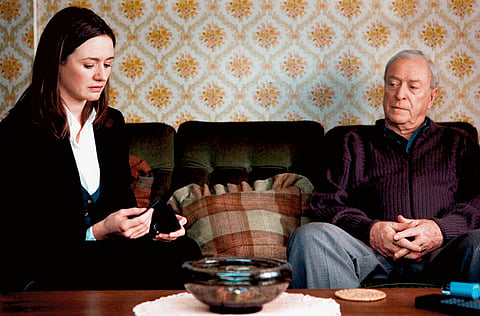Dirty Harry
A pensioner swings into action when his friend is killed.

Harry Brown
Cast Daniel Barber
Director Michael Caine, Emily Mortimer, Charlie Creed-Miles
Rating TBA
Like smokestack soot, revenge colours Harry Brown, the smartly done socio-economic killer thriller that has Michael Caine, at 77, armed and dangerous and mucking around in a world grown toxic around him.
Set in gritty present-day British council lots, circumstance soon turns Caine's Harry from a chess-playing pensioner into a one-man wrecking crew determined to exact justice and bring some order to his violent neighbourhood. But no one, most of all Caine, is playing the sympathy card here. Director Daniel Barber instead paints a bleak world where violence is a way of life and brutally lethal no matter who is wielding the gun.
This is no Death Wish or Gran Torino and there are no avenging angels. Gary Young's script sifts through the detritus of banned substances, disaffected youth, equally disaffected elderly, poverty and public housing.
But in charting Harry's life at this late stage - the daily chess match at a watering hole; the crimes, major and minor, glimpsed through the curtains of his apartment; the solitude that settles in with all the other indignities - old age becomes the film's compelling and surprising central feature.
It's a strong directing debut for Barber, who uses the poignant power of Harry's experience to take a universal cut at decaying communities and the poverty of soul as well as pocket. The line in the sand in Harry Brown is an underground walkway. What should be the main pedestrian thoroughfare between the estates, as they're called in the UK, and the rest of the world is controlled by a gang of young thugs engaged in the drug trade and the fine art of random intimidation.
There is grime everywhere, a broken infrastructure introduced with visceral force. Images fly past, as if Barber has lashed us to the back of a motorcycle behind a driver with mayhem in mind. And indeed that is exactly how he frames the gang initiation rite that involves a horrifying midday, drive-by murder of a young mother.
The very fine Emily Mortimer enters the picture then as Frampton, the lead detective on the case, with Charlie Creed-Miles as her reluctant partner. Like everything else about the film, Mortimer looks worn - from her scuffed shoes to a face scrubbed clean of makeup and hope long ago.
But it is another murder that will define the movie and redefine Harry. It comes with an old friend's fatal decision to confront the gangs because the police won't. Harry's social justice campaign begins with a man who traffics in stolen guns. As it turns out, being old is close to being invisible - no one expects Harry to get dirty. But dirty he gets with bruising action sequences, explosions and foot chases, at least until he runs out breath or his legs fail him.For Caine, the film is literally a return to his roots. His hard-scrabble early years were spent in the same housing project where Harry Brown was shot, and he was one of the young toughs mixing things up. Though the polished veneer of Alfie's playboy and the like would soon define how we thought of him, much of Caine's appeal has always been the dangerous edge lurking behind those heavy-lidded eyes.
Though the years and success have softened him, Caine's found that edge again with Harry, the intensity in his body rising like a fever. Mortimer's Frampton is alone in the rapidly expanding police task force in thinking there is more to Harry than meets the eye. Her clinical coolness plays well off of Caine's controlled heat.
The mystery deepens as the violence escalates, and the film isn't shy about showing all the ways a body can be destroyed. But for all the gruesome death, the movie really has social ills in its sights. In Barber's hands, Harry may be dangerous, but denial's the real killer here.
Sign up for the Daily Briefing
Get the latest news and updates straight to your inbox

